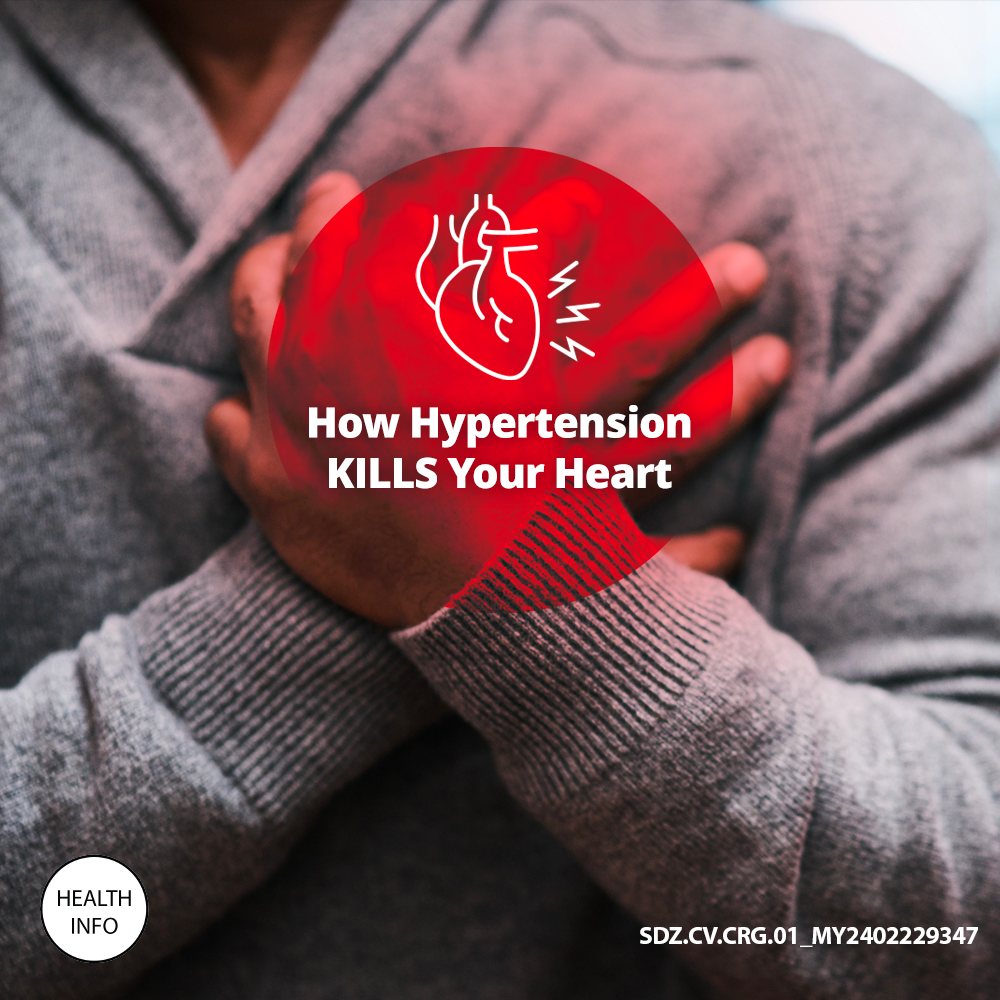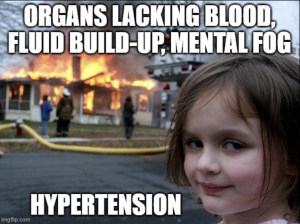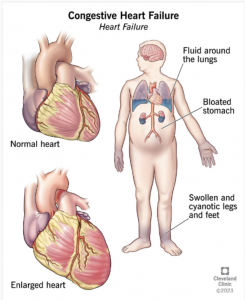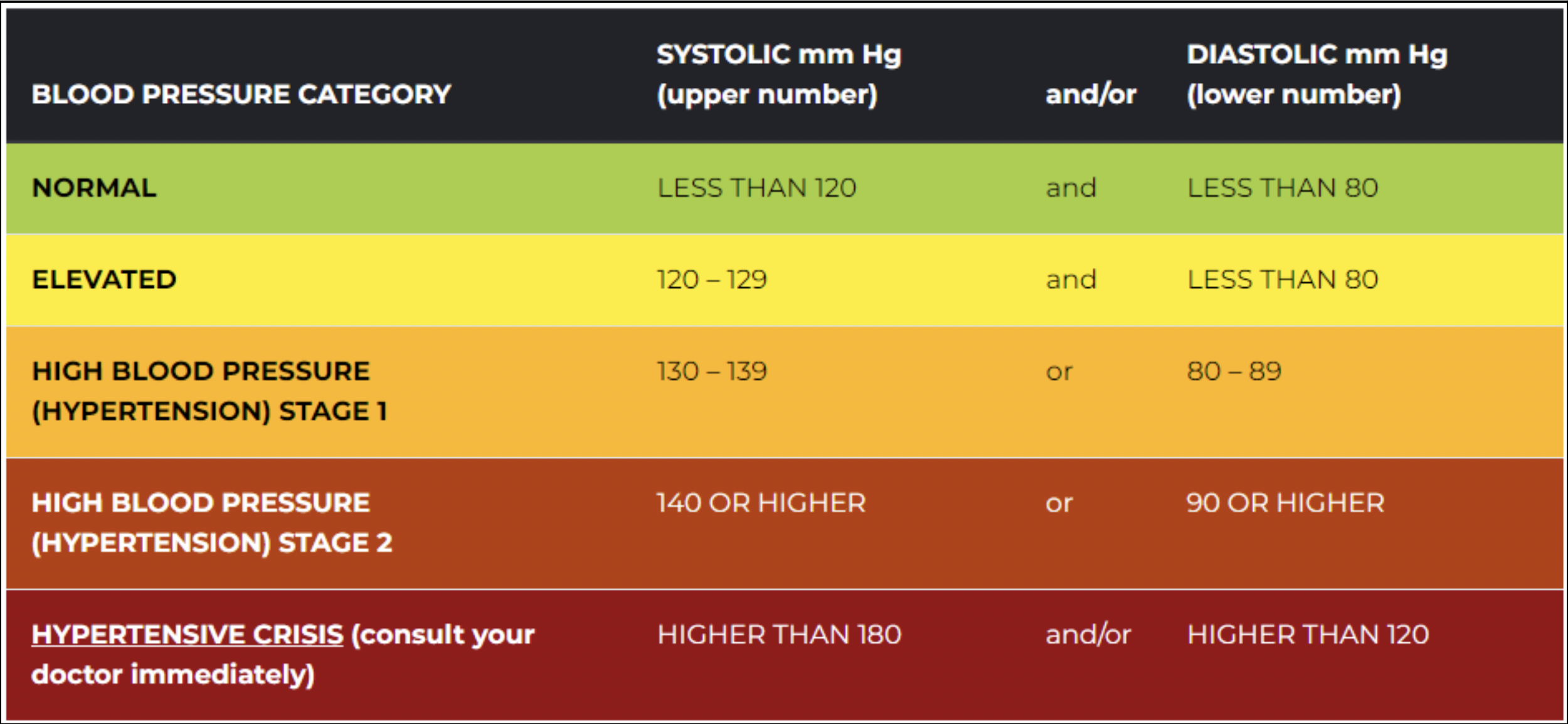- Home
- Health Center
- Health Info
- Hypertension : The Heart Slayer
Hypertension
Hypertension : The Heart Slayer


Ever wonder how one could succumb to heart failure – where could it have all begun? What if I told you that such ill-fated events could be prevented by simply monitoring your blood pressure, and keeping it in check? Here’s a 3-step guide on preventing heart failure from hypertension.
STEP 1: UNDERSTAND
HEART FAILURE! How is it linked to hypertension?
Despite the term, heart failure is actually a long term condition that renders the heart less effective in delivering blood efficiently to organs, NOT literally a failed heart. As a result of hypertension and narrowed arteries, the heart pumps harder on demand, to deliver oxygen and nutrient-rich blood to the body’s cells. Over time, this results in thickening, stiffening and/or weakening of the heart’s walls. It also becomes larger and less efficient, all while still needing to work even forcefully to meet the increasingly high demand for oxygen and nutrients.[1]
What happens in this vicious cycle of high demand and a withering heart?[2]
•Blood backs up in your veins
•Fluid build-up in feet, ankles and legs, known as oedema
•Fluid build-up in lungs, known as pulmonary oedema
•Organs lack blood, nutrients and oxygen.
Wait, didn’t it just start with hypertension?! NOW LOOK AT THE CHAOS!
STEP 2: BEWARE, THE SIGNS!
Fret not! All is not lost, just listen to the signs of heart failure and act quickly! The signs include:[2]
•Fatigue and easily tired
•Coughing or wheezing, especially with activity or lying down
•Swelling in legs, ankles and feet
•Confusion, dizziness or impaired thinking
•Weight gain from fluid buildup
If you experience these symptoms, report them to your doctor at the earliest and get treated.
STEP 3: ACT AND REACT
Don’t wait for the worst before making changes that matter, act now! Since hypertension is a major risk factor for heart failure, start by learning what the blood pressure readings mean. Here’s a quick reference.[3]
Subsequently, fight hypertension, the silent killer, with the following[3-5]:
•Employ a low-salt well-balanced diet. A good example is the Mediterranean diet which includes plenty of whole grains, fruits, vegetables, seafood, beans, and nuts.
•Limit alcohol consumption to no more than two drinks per day for men and one drink per day for women
•Regular physical activity, ideally 150 minutes weekly
•Avoid smoking altogether
•Maintaining healthy weight at a BMI between 18.5 to 24.9 and waist circumference of 35 inches (women) or 40 inches (men)
•Managing stress which may directly increase blood pressure
Keeping your blood pressure in check can save you from heart failure, so keeping a diary of your blood pressure readings is vital. More importantly, attending scheduled health checks and taking the right medications are key in managing all heart related diseases. For a further understanding, do drop by Caring Pharmacy and consult the pharmacist for a heart-to-heart talk about hypertension and heart failure.
References
- How High Blood Pressure Can Lead to Heart Failure. American Heart Association. (Web accessed November 2023). Web link: https://www.heart.org/en/health-topics/high-blood-pressure/health-threats-from-high-blood-pressure/how-high-blood-pressure-can-lead-to-heart-failure
- Fact Sheet: What is Heart Failure? American Heart Association. (Web accessed November 2023). Web link:https://www.heart.org/-/media/Files/Health-Topics/Answers-by-Heart/What-Is-Heart-Failure.pdf
- Changes You Can Make to Manage High Blood Pressure. American Heart Association. (Web accessed November 2023). Web link: https://www.heart.org/en/health-topics/high-blood-pressure/changes-you-can-make-to-manage-high-blood-pressure
- Limiting Alcohol to Manage High Blood Pressure. American Heart Association. (Web accessed November 2023). Web link: https://www.heart.org/en/health-topics/high-blood-pressure/changes-you-can-make-to-manage-high-blood-pressure/limiting-alcohol-to-manage-high-blood-pressure
- Assessing Your Weight. Centers for Disease Control and Prevention (CDC). (Web accessed November 2023). Web link: https://www.cdc.gov/healthyweight/assessing/index.html
Tags
Latest Health Info
Healthy Weight, Happy Joints
How Does Weight Affect Knee Health? The Link Between Pounds And Pain Osteoarthritis (OA) involves the degeneration of joints, which ...
The Gut Warriors: Prebiotics, Probiotics and Postbiotics
When it comes to gut health, you’ve probably heard of prebiotics and probiotics. But did you know there’s also ...
Tip Moreh: Masa Berbuka Puasa
Moreh adalah tradisi unik yang biasanya diadakan selepas solat tarawih pada bulan Ramadan. Ia melibatkan penyediaan dan perkongsian makanan ringan ...



